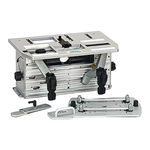
clamp plate is square, re-zero the angle indicator if necessary ➂ .
Scan QR Code
A2-2 Check your test joints for alignment with a straightedge.
The cross represents the inside face toward the clamp face.
The left example shows the clamp plate should be adjusted in
toward the jig body ➀ . The right example shows the clamp
plate should be adjusted away from the jig body ➁ . Test and
adjust the Clamp Plate angle (see A2-3) until the workpieces are
in the same plane, with no joint misalignment.
A2-4 Joint Alignment The Clamp Plate is precision-set parallel
to the table at the factory and should never need attention. However,
if it should need adjustment, here's how. First, loosen the two quadrant
knobs and tilt the Clamp Plate up approximately 1/4" and re-tighten
the knobs. Then slightly loosen the three screws holding the right end
quadrant using the square drive screwdriver ➀ . Use the hex driver to
turn the setscrew in this hole ➁ clockwise to move the right end of the
Clamp Plate in toward the jig ➂ ; counterclockwise to move it out ➃ ,
then tighten the quadrant screws ➀ . The adjusting screw is 28 pitch;
one turn is 0.036"[,9mm]. That's a lot. If adjustment is ever necessary
it will likely be a small fraction of a turn.
JIG ADJUSTMENTS
FMT PRO Appendix II
Jig Adjustments
Finger joint template (116 pages)
Router table dovetail jig (76 pages)
For the leigh d4r pro 24 inch dovetail jig (92 pages)
For the leigh d4r pro dovetail jig (27 pages)
Dovetail jig (26 pages)
Leigh box joint & beehive jig (4 pages)
Dovetail superjig (13 pages)
Router table dovetail jig (2 pages)
Box joint & beehive jig for workbench or router table use (68 pages)
Router table & bench dovetail jig (20 pages)
Leigh through dovetail jig (4 pages)
Multiple mortise and tenon attachment (80 pages)